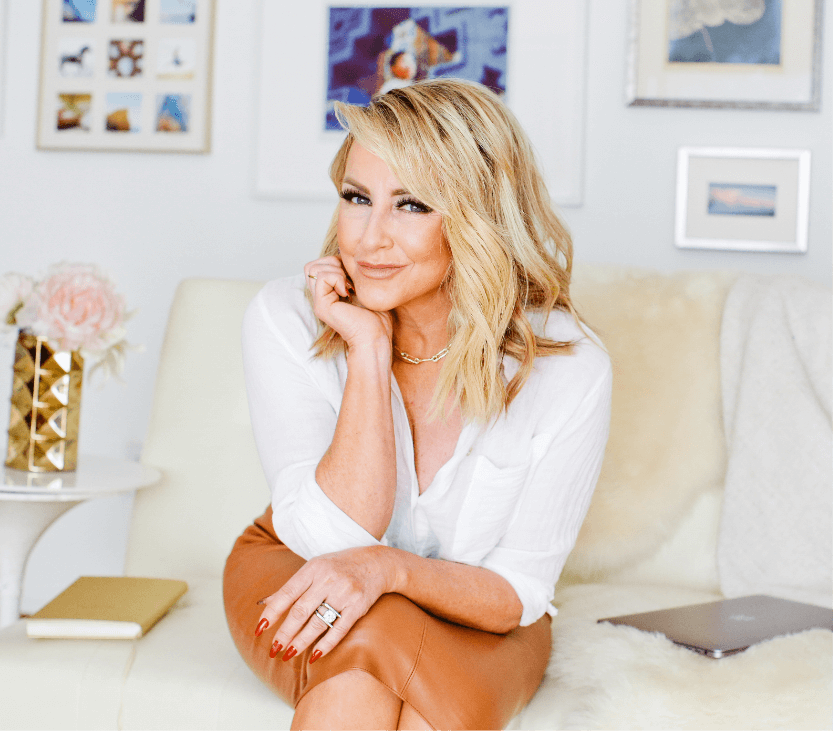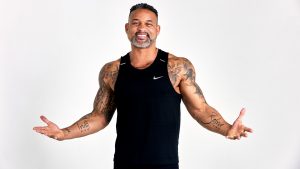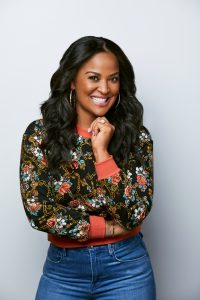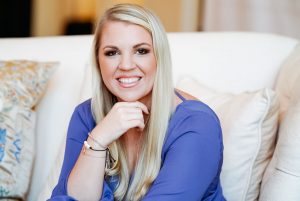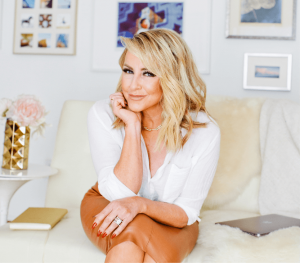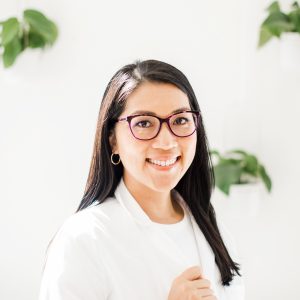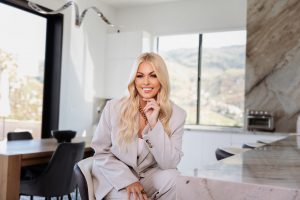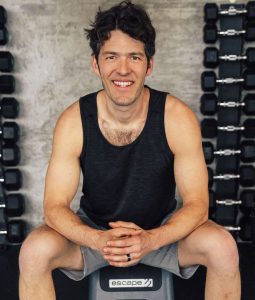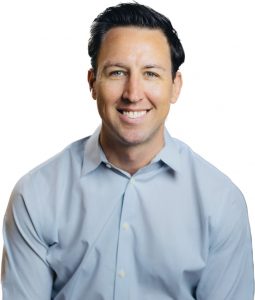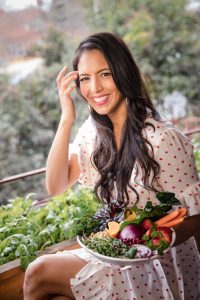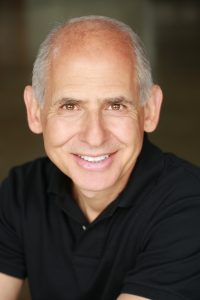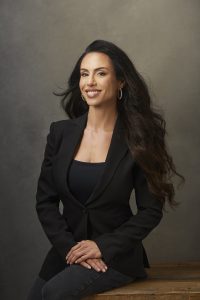SHAWN STEVENSON: Welcome back to the 2023 Family Health and Fitness Summit. This is something special right here. We have somebody who truly we have modeled whether she knows this or not, many different areas of our lives. You change the game for me when you flip this little switch in my mind where of course, we’re trying to build something special to help people, to be of service, to help people to get healthier, building a business. And oftentimes we are programmed to think that we’re gonna have to sacrifice our family life in order to build a business. And you let me know that we can have both. Get you someone who can do both and it really just kind of changed my perspective and it started to have me do things and I just shared this with you before we got started. We’re about to fly out to New York City to do some media, but my boys are coming with me, my family’s coming along with me. I found a way to make it integrated, and there’s always a way. And so that’s what this is all about. And I’m talking about none other than New York Times bestselling author fitness icon, truly Chalene Johnson, welcome to the summit.
CHALENE JOHNSON: Hey, thank you so much. I love that you said that there’s always a way, ’cause that was kind of our mantra. We’re always like, there’s a way, there’s a way. It might look different from the way everybody else is doing it, but there’s a way we can do this that fits with our priorities.
SHAWN STEVENSON: That’s what it’s all about. And it starts with that being a priority. And so if you could start by talking about that, why is family health and wellness so important to you?
CHALENE JOHNSON: Well, we just as a couple, and me as an individual, I just knew like I only have one shot at this. I can’t redo this. Business, if I have faith in myself, I can do that later, I can do that decades from now. But if I truly, really believe that this is the most important thing that I have the honor of doing, which is parenting, I have to get it right. Like that I owe to them, that I owe to the world that it’s part of my makeup. And I don’t think it’s everyone’s makeup. I’m not here to say that everyone needs to live their life or operate their business or align their priorities the way that we did, but once we established our priorities as a couple, we just really did everything we could to maintain boundaries and to make sure that we were honoring those priorities.
SHAWN STEVENSON: Absolutely. As soon as you…
CHALENE JOHNSON: And I’ll tell you what, the rewards are many.
SHAWN STEVENSON: That part. Yeah, and these are the rewards that kind of they start to spill over into everything else. It makes the business stuff, it makes the other stuff outside of what we deem to be like our family life so much more rewarding and creative and more energy gets put into that stuff when we focus on these priorities. And by the way, when you said we got one shot at this, this hit differently, I started to hear the Eminem, “8 Mile” “Lose Yourself” song in my head. You got one shot and also…
CHALENE JOHNSON: I’m from Detroit, so…
SHAWN STEVENSON: Right. That part and it gave me a little bit of solace, and I know everybody else too, knowing that unfortunately we have this kind of societal paradigm where your kids are… You just gotta get them to 18, and then they’re adults. What? No, no, no, no. Parenting pretty much never ends until you end.
CHALENE JOHNSON: Yeah, that’s right.
SHAWN STEVENSON: So no matter where you are on that spectrum of ages with your kids, there’s still an opportunity to make improvements.
CHALENE JOHNSON: Yeah. And it changes all the time. Like right now, the books I’m reading are about how to parent or be a parent to an adult child ’cause it’s very different. It’s kind of a trip. And the reason why that’s important is because our relationships are what make us happy, they are what make us healthy. So regardless of how much you’re crushing it in your business space or physically, whatever, all the things, like if your relationships are screwed up, you can’t think, you can’t return a text, you can’t send an email, you can’t enjoy the fruits of your labor. When your relationships are messed up or they’re just in one of those stages when things aren’t going well with the people who you truly love the most, and the people you want in your life ’cause we all have family members where it’s like, okay, bye. Like it’s we are family by circumstance, we’re family by coincidence, you’re not someone I chose, but when it’s your chosen family and things aren’t going well, it is really hard to find peace, it’s really hard to feel happiness.
SHAWN STEVENSON: Yeah. And that’s really… This is why this matters so much. And it’s so crazy. Like we try to do the other stuff externally and the truth is our relationships are determining how we show up in everything else, truly. Like good relationships make everything exponentially easier. When your relationships are rocky, nothing, nothing seems to come without so much struggle. Like, you gotta dig so deep just to do basic things. And so the mission here is to like, let’s get people investing in what can contribute to their energy, contribute to their success, and that’s contributing to building a healthy family. So I wanna ask you about the culture that you’ve created with your family, with your husband, Brett, with your kids, the microculture you created in your household. What are some of the things that you’ve done to create a culture of health and connection in your family?
CHALENE JOHNSON: Well, I love that you asked me to be a part of this because, I’m gonna be all the way honest and I won’t paint a prettier picture than what really existed ’cause we did some things right, and we did some things wrong, I think. But in the end, our kids are both really naturally into health and fitness. So from the time Brett and I, the first week that we met over 30 years ago, the first thing that we did was went and worked out together. And I’m like, oh, this is what I want. I want a partner who will want, loves exercise and loves fitness, and we can do this for the rest of our lives. And here we are 30 years later and we still exercise together, oftentimes together, but we both make it a priority for each other, for our longevity, for our brain health, for all the things.
CHALENE JOHNSON: And so once we had kids, that was just a natural extension. They saw us exercising, we had a gym in the home. Even before we had like a nice gym in the home, we would still be like doing things in the home or doing things with them from the time they were really young, like taking them out in the stroller for a jog and doing exercises in the park with them, using them as body weight. So like literally the exercise piece of it was from the beginning and I say that, but also wanna encourage anyone who’s like, “We didn’t do that.” It’s never too late. But what you don’t wanna do is, in my opinion, tell your kids that they have to exercise, even to tell your kids it is exercise, then it feels like a punishment.
CHALENE JOHNSON: It always just felt like play, it always just felt like something we got to do. And when they became teenagers, they were still like seeing us exercise all the time. And then they would come in, but we didn’t ever make them do anything. You know what I mean? Like we weren’t those parents like, “You need to go for a run.” We just wanted it to be through osmosis and from them seeing how happy it made us. When they became tweens and all their friends wanted to be on their devices, that was challenging because especially here in California, kids just they don’t go outside and play. They kind of stay inside with all their tech and tools. And so it’s like we had to be really creative then about like, how do we… ‘Cause you can’t have your kid be the weird one, you know what I mean?
CHALENE JOHNSON: And I think the more we’re like, “Okay, you’re not allowed to touch an iPhone or a iPad until you’re 18”, like yeah, good luck with that. So we just found creative ways. So for example, we let them use like phones and cameras to record videos, but we always said like, “You’ve gotta be doing something that’s like fun and active like playing basketball. You can record yourself playing basketball.” So it was like they were using the devices, but it was active-based. So my son, Brock, I don’t even know if we can put the clip in this video, but my Brock and Cierra created this YouTube channel when they were like… I don’t know, 10 and 12 called The Brock Shots and it was him taking a basketball and chucking it.
CHALENE JOHNSON: This is like before Dude Perfect or maybe it was inspired by Dude Perfect. I don’t know, chucking the basketball as far as you possibly could and making these crazy random shots. Well, the thing is, his sister was the person who shagged the ball. So she’s running constantly and he’s throwing constantly, and you have to do like a 100 takes to actually make one. So they would work… They didn’t realize it, but they were exercising, being active outside for hours and hours without us ever having to say like, “Go outside and play.” So it was just being creative with them in terms of the fitness side of things, but never calling it fitness, never calling it exercise. Just encouraging them to have fun and play and do different things outside.
SHAWN STEVENSON: I love this. This is so good. So connecting to something that they want or they enjoy that they want to do. Like what a concept? That sounds so obvious. And I don’t know if you saw this, but our mutual friend, Pat Flynn, was just with the Dude Perfect guys yesterday.
CHALENE JOHNSON: No, no way. That’s awesome.
SHAWN STEVENSON: Little synchronous.
CHALENE JOHNSON: That’s crazy. That’s awesome.
SHAWN STEVENSON: I showed my youngest son, Braden, this. He was like, “Wait, he knows Dude Perfect. No way, no way.”
CHALENE JOHNSON: Oh my gosh. That’s awesome. That’s…
SHAWN STEVENSON: So Brock has been about that life.
CHALENE JOHNSON: Yeah, and it’s funny how it kind of translated later. Like all that throwing motion like crazy distances from such a young age, Brock, I’m sure it helped him as a quarterback. They were undefeated in high school, and he took his team to become CIF champs and then went on to play quarterback in college. So it all translate. In terms of the food though, and nutrition, so I would say they had two different moms, right? They had… I think I had a healthier approach early on where it was like, we buy healthy food, but we weren’t freaks about it. Do you know what I mean? Like wait a second. Does this have GMO? If they wanted and it was like, okay, it’s not that bad, right?
CHALENE JOHNSON: And we just always made sure that we staged the refrigerator and the shelves in our pantry the way they do in the grocery stores so that the things that we wanted to encourage… Look at the grocery stores. They put the things they want you to buy in the end caps, right? They make it really appealing and beautiful and at eye level, especially eye level to your kids. So in my refrigerator, like all the fruits and vegetables were always in clear glass containers. They were already pre-washed and cut or whatever, and they were always at their eye level. So when they opened up the fridge, that was the first thing that they saw. When they went into the pantry, they saw the healthy stuff first. They saw… We had the unhealthy, like the less healthy stuff I should say.
CHALENE JOHNSON: We had that too, but I just always kind of tucked it away. And then I remember there were times where you give in as a parent and they’re like, “I want Fruity Pebbles”, or whatever, the less healthy version is, and I would give it to them for a little while because I didn’t wanna be that parent. And the way I would get them off of it is I would tell a white lie, which it’s legal to do with your children. It is legal to manipulate them, to lie to them. This is all legal. And so I would tell them like, “Oh they didn’t have it. I looked everywhere. I asked the manager if they could put some on order, but they don’t have it anymore.” They’d be like, “Oh, man.” And so then I would like introduce something a little bit healthier, or I’d be like, “It’s okay. I’m making eggs this morning.”
SHAWN STEVENSON: Amazing. We tell them about Santa Claus without hesitation.
CHALENE JOHNSON: Right, right.
SHAWN STEVENSON: But the Fruity Pebbles fairy, they’re not coming right now. I love that. And this idea basically of framing your fridge like a grocery store does, because they’re very intentional in how they’re marketing and framing things, that’s a game changer. I never heard that one before.
CHALENE JOHNSON: Yeah. I also really like the… It’s kind of a slow modification. So for example, when we wanted them to eat, let’s say, like a healthier pancake in the morning, instead of like just putting them right on the gluten-free, switching them off of the buttermilk pancakes to the gluten-free protein pancakes, I would mix them. So it was like 75% buttermilk, 25% healthier version. And then just do the slow gradual trade off. I did that too with their… We were on a protein shake kick for a while, but the first couple of protein shakes I made for them when they wanted like a snack at night, I made them taste like a frigging shake with real chocolate in there and adding whipped cream on top. And then slowly you just put less and less of those things in there.
CHALENE JOHNSON: And then they just… It changes their palate slowly. So I don’t think you need… I don’t think it works when we say to anyone in our family like, we’re doing this, you are doing that. You’re not eating this, you are eating that. I just don’t think that works and I’m gonna be very honest. My kids did not like vegetables. I didn’t make them eat them, and they turned out okay. They’re both very tall and very strong, and they’re gonna be okay. Later on they started to like vegetables and I didn’t make them eat vegetables because I truly do believe that our palates are different. I hated vegetables as a kid, like traumatized by vegetables and it wasn’t until I was like in like high school they started to like them and that was the same for my kids. And so did we supplement for them?
CHALENE JOHNSON: We did, but I just I think even as babies, like I had that kid that was just like would not eat any vegetables. So I’m not saying we’re perfect, but we did our best and we didn’t try to force anything, any food rules. We never said anything was off limits. We talked about things in terms of like we tried to educate them like now so this is high in sugar, and what does that mean for you? Like, here’s how you’re gonna feel. That’s what we explained to them, but it’s your choice and they just kind of more so gravitated to the much healthier food, but not perfect. Definitely not perfect. And when I said they had like two moms, I think the mom that probably did the most damage was me when I got on my super-uber healthy, like I’m obsessing over every ingredient, every toxin, every food dye, every macro.
CHALENE JOHNSON: When I started going deep into that and trying to get my own internal health back, I became… And we’ve talked… You and I have talked about this term before. I think I became an almond mom. My daughter says I was an almond mom lite and an almond mom, for those who aren’t familiar with the term, it’s a mom who becomes so obsessed with health and food and sometimes weight and image and they try to pretend. Not pretend. They try to disguise it like, “Oh, we’ll just have a handful of almonds.” And that I think was a real detriment, especially to my daughter. And we’ve had very honest conversations about that because she was in high school when I kind of went that way, and I know it had an impact on her because that’s when I started labeling foods as bad foods and I became kind of obsessive about my own nutrition. Not like eating less per se, but just obsessed about like, well, what are the ingredients? And so worried about every little thing that our kids pick up on that. So I think it’s really about finding a balance.
SHAWN STEVENSON: True, true. We don’t talk about that word enough. We marvel at that in gymnastics but in real life, in the real world, balance is so important. And also checking ourselves when we start to give food morality that food is good and bad because naturally we attribute character traits to our behaviors. And so if a food is bad and we eat something that is bad, what does that say about us and our character? Am I a bad person?
CHALENE JOHNSON: That’s right.
SHAWN STEVENSON: If I cheat…
CHALENE JOHNSON: That’s right.
SHAWN STEVENSON: My cheat meal, anything else in our culture that is tied to cheating is frowned upon. It’s just like it’s a slippery slope, to say the least.
CHALENE JOHNSON: Yeah. People cheat food we eat. The other thing that I think is really so true about that statement is that when your kids, they even pick up on your energy. Like when you’re dieting, when you’re afraid of food, when you’re… I’m talking to that person who is already healthy. Like you can take that too far. You really, really can and your kids do. They know that you’re not eating the same foods, they know that you are… They can tell that you’re afraid of food, they can tell… And these things are things that our kids pick up on. And conversely, it starts with us not just from like healthy habits, but unhealthy habits start with us too. And again, not to cast any I guess blanket statements or morality around behaviors in your home, but like, I just also remember like going to our kids this weekend or you were just telling me about like going to basketball games and things like that. And I remember when our son was playing Pop Warner Football, so he was like 10 years old and going after the game 1 o’clock in the afternoon to a pizza parlor and all the parents are with these giant pitchers of beer. And I’m like…
CHALENE JOHNSON: And they’re not all calling taxis home and it just… And now we have all these kids around and we’re seeing all the parents celebrating with beer and pizza, and it just always seemed counterproductive to me, which I’m not saying parents shouldn’t drink. I’m just saying like that just didn’t make any sense to me. It still doesn’t.
SHAWN STEVENSON: I love this because what you’re really pointing out here is so powerful, which is like number one, of course we’ve got this modeling component, but more so it’s allowing for choice, it’s allowing for our kids to have exposure to things, but also having a safety net, right? That’s really what it’s about. We don’t put ’em out on the trapeze immediately without the safety net and they end up with the Batman and Robin story, by the way, is what happened with the Robin’s family. I don’t know if you know this in the comics.
CHALENE JOHNSON: No.
SHAWN STEVENSON: But losing his trapeze flying family because they didn’t have the safety net. And so it’s like, we don’t want to go so far that we’re putting our children in harm’s way. Absolutely. And within that, there’s so much more grace and space for our kids to live life and to experience and experiment. And I can relate to this so much because obviously doing this and being about that life with food, we definitely we went through our phase. I think it comes kind of with the package deal in our culture today of having a neurotic phase where everything is like this and that, and the kids when they come, they’re not having that great of a time going from like Domino’s to like this pita pizza with like some hypoallergenic hummus rubbed on their sauce or whatever. And so we had that phase, but transitioning to something that is much more, dare I say, holistic, that word is overused, but truly just like encompassing, this is the culture that we exist in. Let’s upgrade, let’s do that thing.
SHAWN STEVENSON: You want burgers, you want some pizza, you want this ice cream. Let’s find ways that we can do this. Like you said, making that into the most delicious milkshake and the whipped cream and all the things, but you’re providing them with some other really empowering ingredients for their little bodies, whether you’re making a protein shake. So we’re finding ways to kind of sneak in a little bit more food intelligence. And here’s the thing, and this is my point. I know that my kids are going to be exposed to all the things out here on the streets when it comes to food. There are kids who are bringing their lunch. They’ve got the Capri-Suns, they’ve got the fruit roll-ups, they’ve got the Lunchables, and I got my kid. He’s got the whatever, the chicken tenders his mom made from scratch in the… Whatever, and the fruit and all the things.
SHAWN STEVENSON: I know that he’s gonna see that Snickers bar and his friends are gonna be, eat it. So I want to create space where he’s not villainizing that stuff and like saying he’s a bad kid or if he’s eating some candy or whatever the case might be, I want my son to live in reality and I want him to be able to experiment with those things. And also something really great is to like help them to notice how they feel because what has happened with both of my kids is when they’ve dabbled too much, they don’t feel well because they’re generally eating really great food, food that they love. This is the most important point. They love this better food because it’s just real food. They love it. And when they have the opportunity to have the other stuff, which we don’t make off limits, like, don’t you dare. We don’t do that and they get to notice how they feel.
CHALENE JOHNSON: Yeah. This is an interesting concept too. I’m thinking about a whole bunch of things that I don’t wanna forget to mention that are coming back to me ’cause now my kids are adults, right? So I’m trying to think back on like, how did we educate them without them knowing it? So one thing that we did all the time, Shawn, was watched food documentaries. Now I would do a review of it first, but then as a family, those were really powerful documentaries that helped them to understand the body and it was time for us together. And then I didn’t have to be a teacher, Brett didn’t have to be a teacher. We were all kind of like learning this together. And some… There were times… I forget what documentary it was, but it was one about becoming vegan.
CHALENE JOHNSON: And our daughter watched that, and she was 16 years old at the time, and she became vegan for a year. And we’re like, oh, no. Like don’t take offense if you’re vegan, but our family isn’t, but we honored it. And I just kept encouraging her to continue to do her research and to continue to do her research. And at the time, she was a track athlete, and I remember she was on a scholarship trip to the University of San Diego. And I remember her looking at these other girls’ muscle development and just like, how? You know what I mean? And then we went to like a little barbecue with the team afterwards and I think it was like literally that day she saw all these girls eating meat and she was like, “I’m no longer a vegan.” But we let her do her own research, and we let her figure out what felt best for her.
CHALENE JOHNSON: And that’s hard to do sometimes as a parent. We wanna tell them what to do, we wanna get… But the more we say to them, “I trust you and here are the options, here are what you need to weigh, but I think you’re gonna make the right decision”, we empower them. I think early on we did a lot of brainwashing, right? Like for example, if we saw somebody smoking in their car… And by the way, I’m a former smoker. I smoked in college. But I would see somebody smoking in their car and be like, how dumb does that person look right now? And my kids would look and I’m like, smoking is so dumb. You know what I mean? So I was like constantly brainwashing them. So they were like… In their head, they’re like, “Yeah, that’s dumb.”
CHALENE JOHNSON: And we would just talk about fried food. Like when we go back to Michigan in Northern Michigan where my parents have a place on a lake, and you literally couldn’t… You couldn’t find a plain breasted chicken if you tried. Everything is like triple battered, deep fried and just we would talk about like, “I just feel so sick, so gross from this fried food.” You know what I mean? From the time they were like really young and I think it just… Without ever having to give them that information, they were taking it all in through osmosis.
SHAWN STEVENSON: I love that you said it again, osmosis, and that’s truly like… That’s really what we are. We’re social creatures. We pick up so much from our environment, especially from our caretakers, but eventually, and you could speak to this, eventually, our kids’ peers really kind of take over as very influential in their lives and their choices. And I wanna ask you again, you’ve gone through this process of having little ones and now you have adult kids and that process over the years, I would imagine that you’ve experimented with a lot of different things. And so I’m curious about can your kids cook today? Are they able to like…
CHALENE JOHNSON: Oh yeah.
SHAWN STEVENSON: So how did you help to ensure, or just like how do they pick that up, that life skill?
CHALENE JOHNSON: That’s funny. This is a real funny story. Okay, ’cause you’re… I cannot cook at all. I can make toast. I can put things in a bowl that have already been made by somebody else, and I can make an insanely delicious bowl of things that someone else has made. My cookbook that’s in the back, I literally tell everyone like, please know I didn’t make up any of these recipes, not one.” They’re just all approved by me, they’re assembled by me, but they’re from my good friend Aaron Woodbury and my husband. They did all the recipes. So I never cooked. I just was horrible at it. But Brett was Emeril Lagasse. Like he was such an amazing cook and he taught both of our kids how to cook and they loved it.
CHALENE JOHNSON: But we also believed that our job was to raise adults who when they left the home, they knew how to do their own laundry, they knew how to negotiate for an apartment, they knew how to negotiate for a car, that they knew how to have conversations with adults, that they knew how to make their own food, they knew how to clean their own toilets. Like if you’re not teaching your kids how to do that from a really, really young age, you’re just teaching them that you don’t believe in them. And so we wanted them to have all of those life skills early. Earlier the better. And this is interesting. One of my best friends, Monica, she has triplets who were like seven years younger than my kids. And I remember when they were like… I don’t know, maybe like three or four years old, the triplets, she would watch ’em on the little camera, nanny cam. The triplets would get up and they would get dressed.
CHALENE JOHNSON: They had their clothes laid out the night before. They’re like three and four years old, get dressed by themselves, then they would go downstairs and they all had a responsibility. One would start the coffee, I’m not kidding. One would set out the fruit, one would set the plates. And I was like, what am I doing with my life? Like, why can these kids do that and my kids can’t? Because she empowered them to do that. And there’s so many things that even though her kids are much younger than mine, I’m like, I need to get my act together. Like, I’m doing too much for these kids. And we think that that’s how we are great parents. Oh that’s such a loving thing to do. It’s not loving, it’s not loving. It’s coddling. And when we have these weak, coddled kids today, where they are riddled with anxiety, they don’t know that they can… They don’t believe in themselves, they’re afraid to make decisions, they’re afraid to make mistakes and I think that we’ve gone too far with that. So I think the earlier you can get your kids to do all the things, the better.
SHAWN STEVENSON: Yeah, I love this.
CHALENE JOHNSON: Including cooking.
SHAWN STEVENSON: This is so good. You just opened up something that we have not talked about, which is the state of affairs of our kids in the society today, these most recent generations because a lot of times, us we’ve gone through so many difficult things in our generation that we want the best for our kids, and we want to give them the things that we didn’t have and get them in safe environments that we didn’t necessarily have. But with that, how do we intentionally ensure that our kids are developing the resilience and the strength that they need to exist in a world that is still riddled with a lot of craziness? So it’s like, how old were those triplets?
CHALENE JOHNSON: They were like three years old, three and four years old then. Like not even four. I just remember going like, wait, how do they even know what coffee is? They would literally… One would put the ground in the coffee maker and put the… I’m like, are these children or are these like little mini workers? Like it wasn’t…
SHAWN STEVENSON: Little Keebler elves.
CHALENE JOHNSON: That’s right. And they loved it. They would fight over who got to do which job.
SHAWN STEVENSON: Oh my gosh. And this again, I’ve actually seen this firsthand as well. Katie Wellness Mama, who’s a contributor to the summit, spending time with her and her six kids. You’re seeing like her youngest was like three, two or three at the time, and they were like doing their own laundry, sitting up on the counter eating some sauerkraut. I’m just like, what is this? What is this magic strangeness that you got going on? And my youngest son at the time, I think Braden was maybe I’ll just say seven. And I’m just like, why? Like he can do some of these things for himself…
CHALENE JOHNSON: Dude, get a Job.
SHAWN STEVENSON: That we’ve been doing for him. Get a job. But it’s also, again, empowering. And even yesterday, I was trying to do a little laundry and my son, he’s trying to get in there too. Braden’s been doing his laundry ever since that day, ever since we got home from being at her house, we just allowed him to do things for himself. And now it’s just a part of what he does and he feels like this is his responsibility and he has dominion over taking care of himself in these ways.
CHALENE JOHNSON: Yeah, yeah. I think it’s pretty powerful. It’s tempting ’cause we feel like this is how I show love, this is how I care for you. But I just remember another friend being at her house, her children were older than ours, and she was watching me cut Brock’s pancakes. And she goes, “What the hell are you doing?” “I’m cutting his pancakes.” She goes, “He can cut those.” I’m like, “Oh, you’re right. Like literally, you’re right.”
SHAWN STEVENSON: This happened when?
CHALENE JOHNSON: And the pancakes really didn’t have to be cut.
SHAWN STEVENSON: Right. That part, yes. Your friend, Ann, who we just had her on FaceTime, this literally is a thing specifically with pancakes. One day, which I kept on seeing this happen, and this is after the laundry thing. My man’s doing his own laundry. He can cook his own breakfast, but he’s just like, “I don’t know what to do. I don’t know how to cut this.” And I’m just like, “Babe, he can cut the pancakes”, but it was for her. She was like, “No, I want to do it for him.” And it was for her. And there’s a space for that Absolutely, there’s a space for that. And there’s a space for allowing our child to be able to pick up a skill so they’re not out with their friends just like, “Can your mom cut my pancakes for me?” Just like, yeah.
CHALENE JOHNSON: Yeah. And it’s difficult I think for a lot of families right now, especially if you’ve got an athlete or kids that are super active to find time to actually interact as a family in the kitchen in around meal times, because I’m sure a lot of families experience… With our kids, they were three years apart so they were both in their multiple sports. And so we played… Brett and I played man to man, right? So like he would take one, I would take the other and we would go in our different way. And practices never were at the same time, we were never in the kitchen at the same time, but at least one day a week, we would have some meal together in the kitchen, whether it was breakfast or… And one of us was in the kitchen with one of the kids.
CHALENE JOHNSON: I just think times were different when we were growing up maybe when… I remember sitting around the table and I remember we just weren’t as busy. Now parents who are in that season, it is like, go, go, go, go, go, go, go. And all the kids have to be specialized. And so even if they’re playing high school volleyball, then they also have to be playing club volleyball and then they also have to have a private coach. And so literally these kids, they’ve got like full-time jobs. Like it is a full-time job to be as active as most of ’em have to be and that’s really hard to find time to connect around the table and to teach ’em how to cook and to do those things. So you’ve gotta find… You’ve gotta make it. We would go to the farmer’s market on the weekends and make it like this whole thing. God, we bought so much stuff that we just didn’t even need, but it was so beautiful and colorful and then we would come home and prep all that food together. And while it wasn’t necessarily a meal, it was time spent around nutrition and time spent in the kitchen.
SHAWN STEVENSON: This is so awesome. So some of these things that you’ve given us to take away is the modeling and the fact that our kids are picking things up by osmosis. We’ve got connecting our food choices and/or activities to something that they want, that they like, that they enjoy doing like Brock and the all that movement that was…
CHALENE JOHNSON: Brock Shots.
SHAWN STEVENSON: Encased in Brock Shots. We’ve got the reframing, making our kitchen and our refrigerator even like a grocery store and eye level for the little ones. You just shared another powerful insight, which is that market time, right? So your family having that family culture or that little ritual that you were doing of going to the farmer’s market together. And so finding that thing that fits for you and your family that encourages like a culture of wellness.
CHALENE JOHNSON: Yeah. Even if it’s going to the grocery store, right? And having them pick out the produce and having them put things away with you and just even talking about like what things have to go in the refrigerator and why certain things can stay in the pantry and how is that possible? Like just they’re all opportunities to connect around nutrition, and you have to be creative if your time where everyone’s schedule aligns is limited.
SHAWN STEVENSON: Awesome. Well, this has been awesome. This is the opportunity. We’ve got a ton of parents that are listening into this and they want to do well for their kids. We all do. But they really want to be able to help our kids to be healthier, more well-adjusted in this world today. Is there anything else that you want parents to know?
CHALENE JOHNSON: Yeah, I think back on one of my very best friends who our boys were the same age and he was always, sadly in the morbidly obese category as a child. And parents were fit, sister was fit. Just one… Her son was morbidly obese and still is. And I just remember how it would just hurt her heart if he would cry for certain foods and certain things. She felt like she was being mean to him if she didn’t let him eat the thing that he wanted to eat, but I think about how horribly he was teased in school, how much of a struggle it is even for him today and that we have to catch ourselves.
CHALENE JOHNSON: We have to remember that it’s not loving to buy things ’cause you’re the parent. I’m talking like, I remember when he was like eight years old and her giving him like a big giant tub of peanut butter to just eat with a spoon while he watched TV and that’s not loving. It’s actually… I don’t wanna say it’s child abuse, but man, when you know that what you’re giving your kid is poisoning them, and you have to know what is going to happen to their health and their mental wellbeing. There’s nothing worse than a child to have to struggle with their weight when they’re not the ones buying the food. So just a little tough love for that parent out there who’s like thinking like, oh, but they don’t eat that much and their metabolism is slower. It’s calories in, calories out. It is how active the kid is, and you have to remember that as the queen or the king of the home, you’re the person who’s really seriously responsible for their nutrition.
SHAWN STEVENSON: That’s right. We can be benevolent dictators, but we are still in charge. Absolutely. And also, again, thank you so much for sharing that because we’re talking again about that safety net. There’s again, your kids are gonna have exposure to things. They can dabble in a lot of stuff, but we have to have that safety net in place to not allow our kids to get hurt, to go too far and to different things that are truly putting them at risk for all manner of potentially a lifetime of suffering and problems. Yeah. So this is the safety net. Actually shout out to that song. It’s one of my… I love that song. It’s a vibe. I don’t know if you… I’ll send it to you. Ariana Grande, Ty Dolla Sign, “Safety Net”. It’s a vibe. Alright.
CHALENE JOHNSON: Okay, okay.
SHAWN STEVENSON: So this is the second time talking to you…
CHALENE JOHNSON: Ariana Grande, your song right now.
SHAWN STEVENSON: I mean, I have a diverse palette but talking to you, this is the second song that has popped up in the background. You get the vibes going because you’re about that life. Can you let people know where they can connect with you, get more into your universe? Because when I say you’re about that life when it comes to music, dancing, like you are her.
CHALENE JOHNSON: Hey, I appreciate that. Probably the easiest place is my YouTube channel. So it’s youtube/chalenejohnson and that’s where the video podcast is posted.
SHAWN STEVENSON: Awesome. And of course, we’ll put that in the notes along with this interview as well as links to your books and social media, all that good stuff.
CHALENE JOHNSON: Awesome.
SHAWN STEVENSON: But I just wanna say thank you so much. You are always… You have our backs and we appreciate you so much. You’ve been that osmosis thing for us even before we officially met. My wife was just like, “You don’t understand.”
CHALENE JOHNSON: Oh amazing.
SHAWN STEVENSON: “You don’t understand.”
CHALENE JOHNSON: I love Ann so much.
SHAWN STEVENSON: Chalene is about that life. And so we just really do appreciate you. Thank you so much.
CHALENE JOHNSON: I appreciate you too, Shawn. All right. Thanks for having me.
SHAWN STEVENSON: Absolutely. Everybody, thank you so much for tuning into the Family Health and Fitness Summit today. We’ve got much more in store, so make sure to stay tuned.
